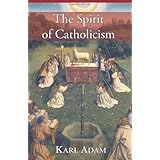Monastic Lectionary of the Divine Office,
Night Office 2 November 2015
| https://www.ewtn.com/library/THEOLOGY/SPIRCATH.HTM |
(edition 1938 Sheed & Ward, Guest Guest House 1960s).
Chapter IX: The Catholicity of the Church
I became all things to all men, that I might save all (1 Cor. ix, 22).
The
Church Suffering and the Church Militant constitute in their relations a second
circle of most vital activities.
(pages 140-142) Having
entered into the night "wherein no man can work," the Suffering
Church cannot ripen to its final blessedness by any efforts of its own, but
only through the help of others—through the intercessory prayers and sacrifices
(suffragia) of those living members of the Body of Christ who being still in
this world are able in the grace of Christ to perform expiatory works. The
Church has from the earliest times faithfully guarded the words of Scripture (2
Macch. xii, 43 ff.) that "it is a holy and a wholesome thing to pray for
the dead that they may be loosed from their sins." The suppliant cry of
her liturgy: "Eternal rest give to them, O Lord, and let perpetual light
shine upon them," can be heard already in the Acts of the martyrdom of SS
Perpetua and Felicitas (A.D. 203) and is represented in numerous sepulchral
inscriptions of the most ancient period, while theologians and Fathers of the
Church, beginning with Tertullian, have supplied its substantial proof. The
theology of the schismatical Greek Church agrees with Latin theology in its
belief in the efficacy of prayers for the dead. So fundamental indeed and so
natural to man's hope and desire and love is this belief, that historians of
religion have discovered it among almost all non-Christian civilized peoples: a
striking illustration of Tertullian's saying that the human soul is naturally
Christian.
The
Catholic, therefore, is jealous to expiate and suffer for the "poor
souls," especially by offering the Eucharistic Sacrifice, wherein Christ's
infinite expiation on the Cross is sacramentally re-presented, and stimulating
and joining itself with the expiatory works of the faithful, passes to the
Church Suffering according to the measure determined by God's wisdom and mercy.
So the saying of St. Paul that the members of the Body of Christ "are
mutually careful one for another" (1 Cor. xii, 25) is nowhere more
comprehensively and luminously fulfilled than in the Church's suffrages for her
dead children. When, in the Memento of the Mass, in the presence of the sacred
Oblation and under the gaze so to speak of the Church Triumphant, she cries to
heaven: "Be mindful also, O Lord, of thy servants and handmaids .... who
have gone before us with the sign of faith and rest in the sleep of
peace," then truly heaven and earth greet each other, the Church
Triumphant, Suffering and Militant meet in a "holy kiss," and the
"whole" Christ with all His members celebrates a blessed love-feast
(agape), a memorial of their communion in love and joy and pain.
+ + +
Karl Adam -
EWTN.com
https://www.ewtn.com/library/THEOLOGY/SPIRCATH.HTM
·
Karl Adam has brilliantly succeeded in achieving his
purpose and "The Spirit of Catholicism"
now stands as one of the finest introductions to the Catholic faith ...




